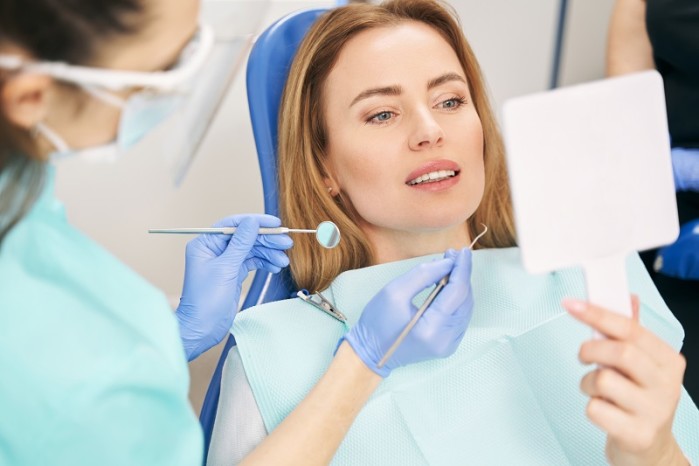Proper oral hygiene – what you need to consider
When it comes to daily oral hygiene, very few people worry about whether the dental hygiene method they use is truly effective. Thorough oral hygiene is essential for long-term dental health. We'll tell you here how perfect oral hygiene works and what you should pay attention to in your daily dental hygiene.

What do we mean by oral hygiene?
The term oral hygiene is generally understood to mean the regular removal of bacterial plaque and food residues in order to maintain long-term dental health. Oral hygiene accordingly means taking preventive measures that reduce the likelihood of dental diseases such as tooth decay or periodontitis and bad breath. You can also save yourself additional visits to the dentist by taking proper care during your daily oral hygiene.
Why oral hygiene is important
There are around 600 to 700 different types of microorganisms in the mouth, which serve to maintain the immune system and protect the mucous membranes. Several trillion bacteria therefore stick to the tongue and teeth and regularly grow back by feeding on leftover food particles. Inadequate oral hygiene can accordingly lead to bacteria and fungi multiplying rapidly and forming a thick coating, known as plaque. If this plaque is not removed through regular oral hygiene, healthy teeth can get damaged. This is because the acid produced by bacteria attacks the tooth enamel, and smelly gases such as hydrogen sulphide and ammonia are released, which is the cause of bad breath. Regular oral hygiene is therefore not only important for preventing bad breath; it also maintains dental health in the long term.

Oral hygiene – How often?
Ideally, you carry out your daily oral and dental hygiene routine in the morning and in the evening. If possible, additional dental care is recommended after meals. But pay attention: due to acidic food or drinks, the tooth enamel will briefly soften, which is why you should wait about half an hour to practise oral hygiene after meals. In the case of excessive consumption of sugary foods as well, it is advisable to carry out your oral hygiene routine more than twice a day.
How long does oral hygiene take?
For optimal oral hygiene at home, you should brush your teeth for at least 2 minutes twice a day in the morning and in the evening You can also plan a few minutes a day for additional dental care with dental floss or a mouth rinse.
mouth rinseBad breath despite dental hygiene
In every country, around one in four people suffers from bad breath, also known as halitosis in specialist terminology. Often, those affected do not have any idea about their affliction, and external parties like to avoid the taboo topic. In around 90% of cases, bad breath is caused by poor oral hygiene, which can be counteracted by thoroughly cleaning the tongue and the interdental spaces. For those affected who wear dentures, as well, thoroughly cleaning the dentures can already lead to an initial improvement. However, poor dental hygiene is not always the cause of the unpleasant odour that forms in the oral cavity. It becomes particularly annoying for those who are affected if they suffer from bad breath despite good oral hygiene. There are different factors that can cause it. On the one hand, insufficient fluid intake can lead to a dry mouth, which can, above all, be caused by nicotine, certain medications, too little food, or stress. On the other hand, long-lasting bad breath can be a symptom of dental problems such as tooth decay, inflammation of the gums and periodontitis. A general illness could also be responsible for bad breath despite good dental hygiene. The latter two causes of bad breath should receive professional treatment by the responsible dentist.
Bad breathImproving oral hygiene – tips
Poor oral hygiene is the number one cause of bad breath and dental problems. It is all the more important to know the most valuable tips for optimal oral and dental hygiene in order to maintain long-term dental health. It is clear that simply brushing one's teeth is not enough on its own to prevent tooth decay and gum disease. Because when you brush your teeth, only about 60 percent of the surface of the teeth is cleaned by the toothbrush. Food and bacterial residues are therefore not adequately removed.
Whether a manual, electric or ultrasonic toothbrush – each can decide that for themselves – it is nevertheless advisable to use toothbrushes with slightly harder bristles, as these are better at removing plaque than soft toothbrushes or natural bristles. But be careful: excessive pressure can damage the gums and tooth enamel. The myth that circular movements are the perfect cleaning technique is also not entirely true. Therefore, try to brush the surfaces of the teeth from the gums downwards, and not applying too much pressure. For particularly sensitive teeth, it is better to use soft toothbrushes. Dense, rounded short-headed brushes are just as good for thorough and gentle removal of dental plaque, as their shape makes it easier to get them to the molars. In addition to having the right toothbrush, we should also clean our mouths and teeth with oral hygiene products such as toothpaste, dental floss and rinses.

Home remedies for oral hygiene at home
There are various types of home remedies that can be used to support conventional oral hygiene at home. You should definitely try out the following home remedies:
Salt water mouthwash
Gargling with salt water naturally promotes the oral flora, has an antibacterial effect and can even replace industrially manufactured mouthwashes.
Birch sugar combats caries bacteria
As a natural sugar substitute, xylitol counteracts bacteria by removing the basic food resource for the caries bacteria. In addition, birch sugar makes the teeth appear smoother and keeps them healthy over the long term.
Oral hygiene with coconut oil
It is already well known that coconut oil has many different uses in terms of cosmetic or skincare purposes. Oil pulling with coconut oil also makes it a supplementary aid in oral hygiene. It has an antibacterial effect and prevents dental problems.
Difference between oral hygiene and teeth cleaning
As you have already learned, regular oral hygiene is mainly used to remove bacterial plaque and food residues. Even when you have optimal dental and oral hygiene though, bacteria and plaque remain, which can lead to tartar and inflammation in the oral cavity. It is therefore important to also keep clean those areas that you don't reach during your daily oral hygiene routine. Professional teeth cleaning can be used for this. The key difference to conventional oral hygiene is that the professional teeth cleaning uses special instruments that not only remove bacteria but also remove tartar and plaque. Regular oral hygiene conducted by dentists is therefore essential to preserve your dental health over the long term.
Oral hygiene at the dentist – what do they do?
Professional oral hygiene is used for dental prophylaxis and is carried out in several steps:
Thorough examination and documentation of the condition of the teeth
Removal of tartar and plaque
Cleaning the teeth and the interdental spaces
Subsequent polishing and smoothing with fluoride-containing toothpaste
Application of a fluoride varnish or gel
Oral hygiene instructions from the responsible dentist
In addition to prophylactic oral hygiene, you can also get information about your oral hygiene status from your dentist. This is determined by several different examinations and provides information about the current status of your oral hygiene. Using different oral hygiene indices, such as the tartar or plaque index, your dentist can identify which areas of your oral hygiene can still be improved and, therefore, give you oral hygiene instructions that you can follow to ensure improved oral hygiene in the future.
What does oral hygiene cost at a dentist?
The costs for a professional oral hygiene session or a professional teeth cleaning by a dentist are around 80 to 120 pounds and can vary depending on the amount of time and effort required.